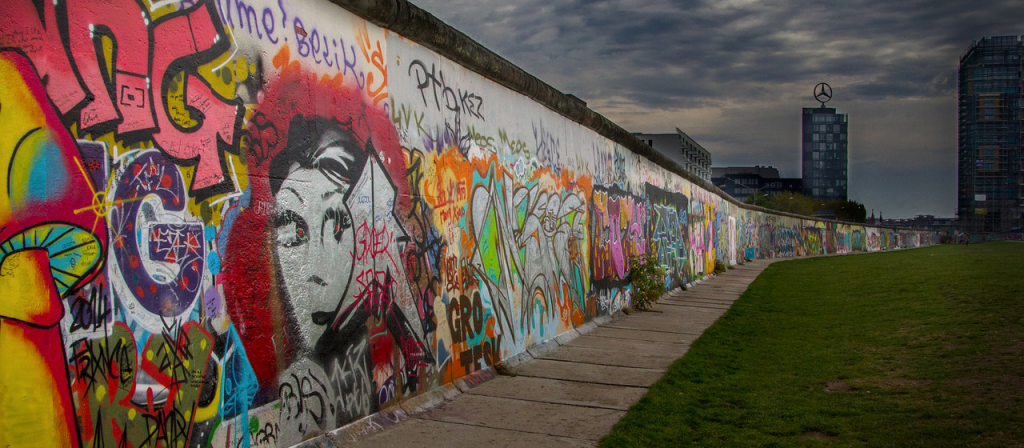 Although the collapse of the Berlin wall was seen as an ultimate triumph, and a victory for liberal democracy, there are plenty of problems, still, and plenty of history left, says Augustana professor Petr Mirejovsky. (Photo: Ira Gorelick/Pixabay)
Although the collapse of the Berlin wall was seen as an ultimate triumph, and a victory for liberal democracy, there are plenty of problems, still, and plenty of history left, says Augustana professor Petr Mirejovsky. (Photo: Ira Gorelick/Pixabay)
It's been thirty years since the Berlin Wall came down in 1989. It was a momentous event that profoundly changed the face of Europe and affected much of the rest of the world as well.
Golo Mann, the German historian, argued that "in Europe, something unexpected always happens to change existing conditions. It is unimaginable, until it occurs." Mann was describing the momentous developments which took place in Europe in the middle of the 19th Century, but they fit what happened throughout Eastern Europe in the fall of 1989 to a T.
In January 1989, Erich Honnecker, the then leader of Communist East Germany, confidently stated that the wall dividing Berlin would stay in place for another one hundred years. At the time, there was no reason to doubt Honnecker's determination. Europe was divided in two ever since the end of the Second World War. For many of us, the term Iron Curtain was not just a figure of speech, but a grim reality, loaded with meaning. It was the cruel and impermeable divide. The Berlin Wall was just a small part of it. The rest of it was formed by barbed wire fences, minefields and walls. It did not just divide cities and countries. It divided and separated friends and families-including mine.
In January 1989, there did not seem to be much reason to hope that this unpleasant reality would change anytime soon. And yet, by the end of that marvellous year, the Wall was gone, and with it the other barriers which divided Europe ever since the 1940s. The regimes which those barriers had kept afloat for many decades followed them in quick succession. Unimaginable-until it occurred. A combination of geopolitical and internal economic, social and ethnic pressures demonstrated the inherent weaknesses of the Soviet system. Gorbachev's glasnost came too late, and, in the end, merely helped accelerate the demise of the Soviet Union
The American political scientist Francis Fukuyama concluded that the collapse of the Soviet-sponsored regimes throughout Eastern Europe represented not just a victory for liberal democracy, but its ultimate triumph, and, indeed the End of History. However, such optimism withered, face to face with the less pleasant aspects and consequences of the new realities. It turns out there are plenty of problems, plenty of history left. Still, we should not forget about the positive things which have happened in the last thirty years.
Europe is no longer divided-or at least not in the manner it had been from the 1940s until 1989. The threat of a major war breaking out in Europe has been greatly reduced. Borders throughout much of Europe have become a lot less important. People and goods can cross most of them quite easily. Most countries in Europe and most of their inhabitants are more prosperous than they have ever been. People can travel now from Spain to Finland without ever having to produce a passport!
Unless you have even been deprived of your freedom, you cannot fully appreciate the feelings associated with regaining it. In 1989, when East German cars were able to pass through what was the Iron Curtain, I was able to visit with my mother in Prague…for the first time in over twenty years! With the collapse of the Berlin Wall the world became better for my family and for millions of others. If that is not something to cheer about, what is?
There are reasons to be cautious. The rise of radical Islam, anti-Semitism, populism and a worrying resurgence of ethnic nationalism in many areas are just the volatile mixture that might lead to the "clash of civilizations" that political scientist Samuel Huntington, historian Bernard Lewis and others have warned about. Such a "clash" could be just as traumatic, divisive and as dangerous as the Cold War once was.
Having studied history for many years, I am less and less sure that there are any lessons to be learned from the relentless flow of events-other than in the broadest outlines. If pressed hard, I would perhaps suggest we should be wary of people and ideologies offering simple solutions to complex problems. We should not trust anyone who claims that their answers, their solutions, are the only ones that are true and valid.
To end on a note of optimism, let us return to Golo Mann: "…something unexpected always happens to change existing conditions. It is unimaginable, until it occurs." Not anything to rely on, but, perhaps, something to hope for.
Petr Mirejovsky, History, Augustana Campus, University of Alberta. This column was originally published in the Camrose Booster on January 28, 2020.